- Home
- Lewis Carroll
Through the Looking-Glass and What Alice Found There Page 2
Through the Looking-Glass and What Alice Found There Read online
Page 2
‘Now, if you’ll only attend, Kitty, and not talk so much, I’ll tell you all my ideas about Looking-glass House. First, there’s the room you can see through the glass – that’s just the same as our drawing-room, only the things go the other way. I can see all of it when I get upon a chair – all but the bit just behind the fireplace. Oh! I do so wish I could see that bit! I want so much to know whether they’ve a fire in the winter: you never can tell, you know, unless our fire smokes, and then smoke comes up in that room too – but that may be only pretence, just to make it look as if they had a fire. Well then, the books are something like our books, only the words go the wrong way; I know that, because I’ve held up one of our books to the glass, and then they hold up one in the other room.
‘How would you like to live in Looking-glass House, Kitty? I wonder if they’d give you milk in there? Perhaps Looking-glass milk isn’t good to drink – But oh, Kitty! now we come to the passage. You can just see a little peep of the passage in Looking-glass House, if you leave the door of our drawing-room wide open: and it’s very like our passage as far as you can see, only you know it may be quite different on beyond. Oh, Kitty! how nice it would be if we could only get through into Looking-glass House! I’m sure it’s got, oh! such beautiful things in it! Let’s pretend there’s a way of getting through into it, somehow, Kitty. Let’s pretend the glass has got all soft like gauze, so that we can get through. Why, it’s turning into a sort of mist now, I declare! It’ll be easy enough to get through –’ She was up on the chimney-piece while she said this, though she hardly knew how she had got there. And certainly the glass was beginning to melt away, just like a bright silvery mist.
In another moment Alice was through the glass, and had jumped lightly down into the Looking-glass room. The very first thing she did was to look whether there was a fire in the fireplace, and she was quite pleased to find that there was a real one, blazing away as brightly as the one she had left behind. ‘So I shall be as warm here as I was in the old room,’ thought Alice: ‘warmer, in fact, because there’ll be no one here to scold me away from the fire. Oh, what fun it’ll be, when they see me through the glass in here, and can’t get at me!’
Then she began looking about and noticed that what could be seen from the old room was quite common and uninteresting, but that all the rest was as different as possible. For instance, the pictures on the wall next to the fire seemed to be all alive, and the very clock on the chimney-piece (you know you can only see the back of it in the Looking-glass) had got the face of a little old man, and grinned at her.
‘They don’t keep this room so tidy as the other,’ Alice thought to herself, as she noticed several of the chessmen down in the hearth among the cinders: but in another moment, with a little ‘Oh!’ of surprise, she was down on her hands and knees watching them. The chessmen were walking about, two and two!
‘Here are the Red King and the Red Queen,’ Alice said (in a whisper, for fear of frightening them), ‘and there are the White King and the White Queen sitting on the edge of the shovel – and here are two Castles walking arm in arm – I don’t think they can hear me,’ she went on, as she put her head closer down, ‘and I’m nearly sure they can’t see me. I feel somehow as if I were invisible –’
Here something began squeaking on the table behind Alice, and made her turn her head just in time to see one of the White Pawns roll over and begin kicking: she watched it with great curiosity to see what would happen next.
‘It is the voice of my child!’ the White Queen cried out as she rushed past the King, so violently that she knocked him over among the cinders. ‘My precious Lily! My imperial kitten!’ and she began scrambling wildly up the side of the fender.
‘Imperial fiddlestick!’ said the King, rubbing his nose, which had been hurt by the fall. He had a right to be a little annoyed with the Queen, for he was covered with ashes from head to foot.
Alice was very anxious to be of use, and, as the poor little Lily was nearly screaming herself into a fit, she hastily picked up the Queen and set her on the table by the side of her noisy little daughter.
The Queen gasped, and sat down: the rapid journey through the air had quite taken away her breath and for a minute or two she could do nothing but hug the little Lily in silence. As soon as she had recovered her breath a little, she called out to the White King, who was sitting sulkily among the ashes, ‘Mind the volcano!’
‘What volcano?’ said the King, looking up anxiously into the fire, as if he thought that was the most likely place to find one.
‘Blew – me – up,’ panted the Queen, who was still a little out of breath. ‘Mind you come up – the regular way – don’t get blown up!’
Alice watched the White King as he slowly struggled up from bar to bar, till at last she said, ‘Why, you’ll be hours and hours getting to the table, at that rate. I’d far better help you, hadn’t I?’ But the King took no notice of the question: it was quite clear that he could neither hear her nor see her.
So Alice picked him up very gently, and lifted him across more slowly than she had lifted the Queen, that she mightn’t take his breath away; but, before she put him on the table, she thought she might as well dust him a little, he was so covered with ashes.
She said afterwards that she had never seen in all her life such a face as the King made, when he found himself held in the air by an invisible hand, and being dusted: he was far too much astonished to cry out, but his eyes and his mouth went on getting larger and larger, and rounder and rounder, till her hand shook so with laughing that she nearly let him drop upon the floor.
‘Oh! please don’t make such faces, my dear!’ she cried out, quite forgetting that the King couldn’t hear her. ‘You make me laugh so that I can hardly hold you! And don’t keep your mouth so wide open! All the ashes will get into it – there, now I think you’re tidy enough!’ she added, as she smoothed his hair, and set him upon the table near the Queen.
The King immediately fell flat on his back, and lay perfectly still; and Alice was a little alarmed at what she had done, and went round the room to see if she could find any water to throw over him. However, she could find nothing but a bottle of ink, and when she got back with it she found he had recovered, and he and the Queen were talking together in a frightened whisper – so low, that Alice could hardly hear what they said.
The King was saying, ‘I assure you, my dear, I turned cold to the very ends of my whiskers!’
To which the Queen replied, ‘You haven’t got any whiskers.’
‘The horror of that moment,’ the King went on, ‘I shall never, never forget!’
‘You will, though,’ the Queen said, ‘if you don’t make a memorandum of it.’
Alice looked on with great interest as the King took an enormous memorandum-book out of his pocket, and began writing. A sudden thought struck her, and she took hold of the end of the pencil, which came some way over his shoulder, and began writing for him.
The poor King looked puzzled and unhappy, and struggled with the pencil for some time without saying anything; but Alice was too strong for him, and at last he panted out, ‘My dear! I really must get a thinner pencil. I can’t manage this one a bit: it writes all manner of things that I don’t intend –’
‘What manner of things?’ said the Queen, looking over the book (in which Alice had put ‘The White Knight is sliding down the poker. He balances very badly’). ‘That’s not a memorandum of your feelings!’
There was a book lying near Alice on the table, and while she sat watching the White King (for she was still a little anxious about him, and had the ink all ready to throw over him, in case he fainted again), she turned over the leaves, to find some part that she could read, ‘– for it’s all in some language I don’t know,’ she said to herself.
It was like this.
She puzzled over this for some time, but at last a bright thought struck her. ‘Why, it’s a Looking-glass book, of course! And if I hold it up to a glass, the words will all
go the right way again.’
This was the poem that Alice read.
JABBERWOCKY
’Twas brillig, and the slithy toves
Did gyre and gimble in the wabe;
All mimsy were the borogoves,
And the mome raths outgrabe.
‘Beware the Jabberwock, my son!
The jaws that bite, the claws that catch!
Beware the Jubjub bird, and shun
The frumious Bandersnatch!’
He took his vorpal sword in hand:
Long time the manxome foe he sought –
So rested he by the Tumtum tree,
And stood awhile in thought.
And as in uffish thought he stood,
The Jabberwock, with eyes of flame,
Came whiffling through the tulgey wood,
And burbled as it came!
One, two! One, two! And through and through
The vorpal blade went snicker-snack!
He left it dead, and with its head
He went galumphing back.
‘And hast thou slain the Jabberwock?
Come to my arms, my beamish boy!
O frabjous day! Callooh! Callay!’
He chortled in his joy.
’Twas brillig, and the slithy toves
Did gyre and gimble in the wabe;
All mimsy were the borogoves,
And the mome raths outgrabe.
‘It seems very pretty,’ she said when she had finished it, ‘but it’s rather hard to understand!’ (You see she didn’t like to confess, even to herself, that she couldn’t make it out at all.) ‘Somehow it seems to fill my head with ideas – only I don’t exactly know what they are! However, somebody killed something: that’s clear, at any rate –’
‘But oh!’ thought Alice, suddenly jumping up, ‘if I don’t make haste I shall have to go back through the Looking-glass, before I’ve seen what the rest of the house is like! Let’s have a look at the garden first!’ She was out of the room in a moment, and ran down stairs – or, at least, it wasn’t exactly running, but a new invention for getting down stairs quickly and easily, as Alice said to herself. She just kept the tips of her fingers on the hand-rail, and floated gently down without even touching the stairs with her feet; then she floated on through the hall, and would have gone straight out at the door in the same way, if she hadn’t caught hold of the door-post. She was getting a little giddy with so much floating in the air, and was rather glad to find herself walking again in the natural way.
2
The Garden of Live Flowers
‘I should see the garden far better,’ said Alice to herself, ‘if I could get to the top of that hill: and here’s a path that leads straight to it – at least, no, it doesn’t do that –’ (after going a few yards along the path, and turning several sharp corners), ‘but I suppose it will at last. But how curiously it twists! It’s more like a corkscrew than a path! Well, this turn goes to the hill, I suppose – no, it doesn’t! This goes straight back to the house! Well then, I’ll try it the other way.’
And so she did: wandering up and down, and trying turn after turn, but always coming back to the house, do what she would. Indeed, once, when she turned a corner rather more quickly than usual, she ran against it before she could stop herself.
‘It’s no use talking about it,’ Alice said, looking up at the house and pretending it was arguing with her. ‘I’m not going in again yet. I know I should have to get through the Looking-glass again – back into the old room – and there’d be an end of all my adventures!’
So, resolutely turning her back upon the house, she set out once more down the path, determined to keep straight on till she got to the hill. For a few minutes all went on well, and she was just saying, ‘I really shall do it this time –’ when the path gave a sudden twist and shook itself (as she described it afterwards), and the next moment she found herself actually walking in at the door.
‘Oh, it’s too bad!’ she cried. ‘I never saw such a house for getting in the way! Never!’
However, there was the hill full in sight, so there was nothing to be done but start again. This time she came upon a large flower-bed, with a border of daisies, and a willow-tree growing in the middle.
‘O Tiger-lily,’ said Alice, addressing herself to one that was waving gracefully about in the wind, ‘I wish you could talk!’
‘We can talk,’ said the Tiger-lily: ‘when there’s anybody worth talking to.’
Alice was so astonished that she could not speak for a minute: it quite seemed to take her breath away. At length, as the Tiger-lily only went on waving about, she spoke again, in a timid voice – almost in a whisper. ‘And can all the flowers talk?’
‘As well as you can,’ said the Tiger-lily. ‘And a great deal louder.’
‘It isn’t manners for us to begin, you know,’ said the Rose, ‘and I really was wondering when you’d speak! Said I to myself, “Her face has got some sense in it, though it’s not a clever one!” Still, you’re the right colour, and that goes a long way.’
‘I don’t care about the colour,’ the Tiger-lily remarked. ‘If only her petals curled up a little more, she’d be all right.’
Alice didn’t like being criticized, so she began asking questions. ‘Aren’t you sometimes frightened at being planted out here, with nobody to take care of you?’
‘There’s the tree in the middle,’ said the Rose: ‘what else is it good for?’
‘But what could it do, if any danger came?’ Alice asked.
‘It could bark,’ said the Rose.
‘It says “Bough-wough!”’ cried a Daisy: ‘that’s why its branches are called boughs!’
‘Didn’t you know that?’ cried another Daisy, and here they all began shouting together, till the air seemed quite full of little shrill voices. ‘Silence, every one of you!’ cried the Tiger-lily, waving itself passionately from side to side, and trembling with excitement. ‘They know I can’t get at them!’ it panted, bending its quivering head towards Alice, ‘or they wouldn’t dare to do it!’
‘Never mind!’ Alice said in a soothing tone, and stooping down to the daisies, who were just beginning again, she whispered, ‘If you don’t hold your tongues, I’ll pick you!’
There was silence in a moment, and several of the pink daisies turned white.
‘That’s right!’ said the Tiger-lily. ‘The daisies are worst of all. When one speaks, they all begin together, and it’s enough to make one wither to hear the way they go on!’
‘How is it you can all talk so nicely?’ Alice said, hoping to get it into a better temper by a compliment. ‘I’ve been in many gardens before, but none of the flowers could talk.’
‘Put your hand down, and feel the ground,’ said the Tiger-lily. ‘Then you’ll know why.’
Alice did so. ‘It’s very hard,’ she said, ‘but I don’t see what that has to do with it.’
‘In most gardens,’ the Tiger-lily said, ‘they make the beds too soft – so that the flowers are always asleep.’
This sounded a very good reason, and Alice was quite pleased to know it. ‘I never thought of that before!’ she said.
‘It’s my opinion that you never think at all,’ the Rose said in a rather severe tone.
‘I never saw anybody looked stupider,’ a Violet said, so suddenly, that Alice quite jumped; for it hadn’t spoken before.
‘Hold your tongue!’ cried the Tiger-lily. ‘As if you ever saw anybody! You keep your head under the leaves, and snore away there, till you know no more what’s going on in the world, than if you were a bud!’
‘Are there any more people in the garden besides me?’ Alice said, not choosing to notice the Rose’s last remark.
‘There’s one other flower in the garden that can move about like you,’ said the Rose. ‘I wonder how you do it –’ (‘You’re always wondering,’ said the Tiger-lily), ‘but she’s more bushy than you are.’
‘Is she like me?’ Alice asked eagerly, for the tho
ught crossed her mind, ‘There’s another little girl in the garden, somewhere!’
‘Well, she has the same awkward shape as you,’ the Rose said, ‘but she’s redder – and her petals are shorter, I think.’
‘Her petals are done up close, almost like a dahlia,’ the Tiger-lily interrupted: ‘not tumbled about anyhow, like yours.’
‘But that’s not your fault,’ the Rose added kindly: ‘you’re beginning to fade, you know – and then one can’t help one’s petals getting a little untidy.’
Alice didn’t like this idea at all: so, to change the subject, she asked, ‘Does she ever come out here?’
‘I daresay you’ll see her soon,’ said the Rose. ‘She’s one of the thorny kind.’
‘Where does she wear the thorns?’ Alice asked with some curiosity.
‘Why, all round her head, of course,’ the Rose replied. ‘I was wondering you hadn’t got some too. I thought it was the regular rule.’
‘She’s coming!’ cried the Larkspur. ‘I hear her footstep, thump, thump, along the gravel-walk!’
Alice looked round eagerly, and found that it was the Red Queen. ‘She’s grown a good deal!’ was her first remark. She had indeed: when Alice first found her in the ashes, she had been only three inches high – and here she was, half a head taller than Alice herself!
‘It’s the fresh air that does it,’ said the Rose: ‘wonderfully fine air it is, out here.’
‘I think I’ll go and meet her,’ said Alice, for, though the flowers were interesting enough, she felt that it would be far grander to have a talk with a real Queen.
‘You can’t possibly do that,’ said the Rose: ‘I should advise you to walk the other way.’

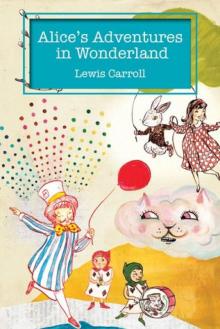 Alice's Adventures in Wonderland & Through the Looking-Glass
Alice's Adventures in Wonderland & Through the Looking-Glass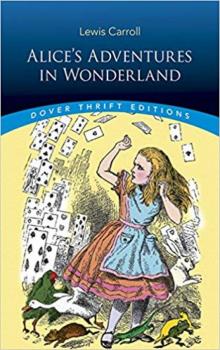 Alice's Adventures in Wonderland
Alice's Adventures in Wonderland O Frabjous Day!
O Frabjous Day! Jabberwocky and Other Nonsense
Jabberwocky and Other Nonsense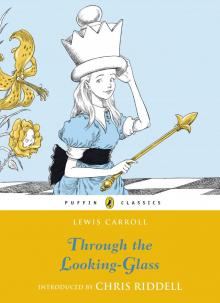 Through the Looking-Glass and What Alice Found There
Through the Looking-Glass and What Alice Found There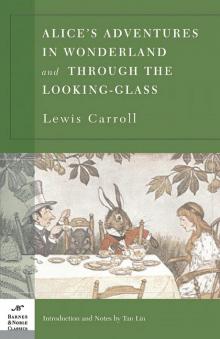 Alice's Adventures in Wonderland and Through the Looking Glass (B&N)
Alice's Adventures in Wonderland and Through the Looking Glass (B&N) Alice's Adventures in Wonderland and Through the Looking Glass (Barnes & Noble Cla
Alice's Adventures in Wonderland and Through the Looking Glass (Barnes & Noble Cla The hunting of the Snark
The hunting of the Snark The Complete Alice in Wonderland (Wonderland Imprints Master Editions)
The Complete Alice in Wonderland (Wonderland Imprints Master Editions) Alice in Wonderland: The Vampire Slayer
Alice in Wonderland: The Vampire Slayer Phantasmagoria and Other Poems
Phantasmagoria and Other Poems Complete Works of Lewis Carroll
Complete Works of Lewis Carroll Alice's Adventures in Wonderland illustrated
Alice's Adventures in Wonderland illustrated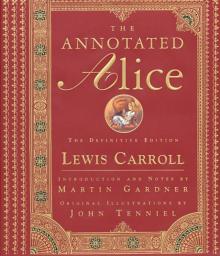 The Annotated Alice: The Definitive Edition (The Annotated Books)
The Annotated Alice: The Definitive Edition (The Annotated Books) Through the Looking Glass
Through the Looking Glass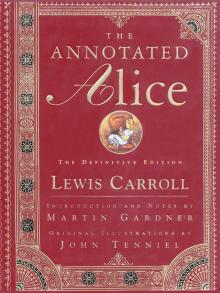 The Annotated Alice
The Annotated Alice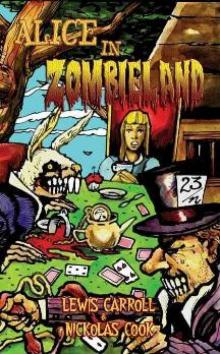 Alice in Zombieland
Alice in Zombieland